
Montessori School of Fort Worth Brings Success
Over the course of five decades, the school has developed lifelong learners.
Two years ago, Kristen Carr ’09 MS walked into one of the modest ranch houses on the campus of the Montessori School of Fort Worth and felt that something about the place was different. When her son, Grayson, who had just turned 1, started playing without hesitation alongside his future classmates, Carr’s butterflies disappeared.
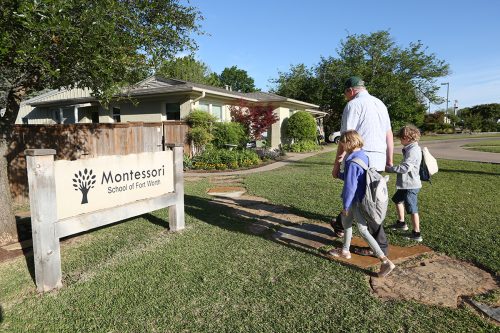
Patrick McCarty walks his children, Nora (left) and Evan, to school. The Montessori School of Fort Worth was founded in 1968 and now educates students in preschool through eighth grade. The Montessori method encourages students to learn at their own pace. Photo by Carolyn Cruz
“Some of the programs we visited required kids to sit at desks, which is a more passive kind of learning,” said Carr, an assistant professor of communication studies at TCU. “In the toddler classroom, he could roam around and try things himself. He got upset that day when it was time to go.”
Grayson, now 3, continues to flourish at the private school. “A few months ago, he and I were in our playroom at home working with some of his magnet tiles, and he said, ‘Mama, this is an equilateral triangle and this one is an isosceles,’ ” Carr said. “I mentioned that to his teacher, and she said he’d never actually had that as an official lesson but must have picked it up listening in on a lesson for the older kids.”
Carr relishes that she found a school where her son’s abiding inquisitiveness propels his learning. “As someone who places a lot of importance on education, the No. 1 thing I think sets students up for success is curiosity, which is something the Montessori School of Fort Worth excels in fostering in even the youngest children.”
Lasting Impression
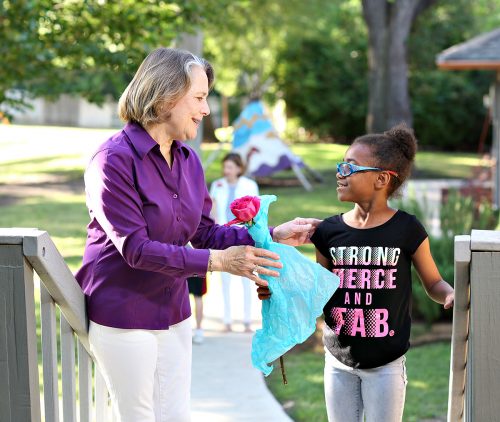
Head of School Amy Henderson gets a flower from Hanna Boone during Teacher Appreciation Week. Photo by Carolyn Cruz
As the school in southwest Fort Worth prepares to mark its 50th anniversary, generations of former students, their parents and even some grandparents are poised to celebrate its effect on their lives and the community, including strong ties to TCU.
In 1968, Joy Sheffield ’61 MEd and LaVerne Davis co-founded the school, fulfilling a long-held dream of educating young children in an open, individualized and collaborative environment. Originally situated in a single house about five miles west of TCU, the school adheres to the principles of pioneering educator Maria Montessori (1870-1952), who created a system of teaching based on the belief that even the youngest children will thrive when encouraged to pursue their passions.
Today, Amy Henderson ’81 MEd owns and operates the Montessori school, which educates students from preschool through eighth grade. As a passionate proponent of Montessori’s success-begets-success philosophy through building knowledge, skills and confidence, Henderson has dedicated her career to creating lifelong learners.
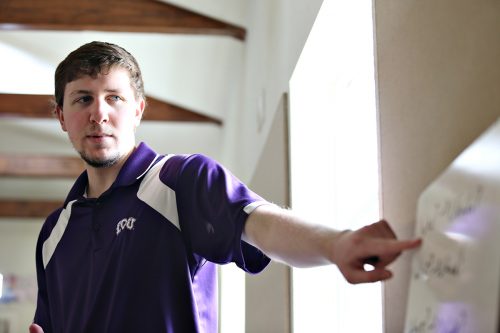
TCU student teacher Jonathan Pickell teaches Spanish at the Montessori School in Fort Worth. Photo by Carolyn Cruz
“One of the best things was that as a student you set your own goals and worked at your own pace,” said Jonathan Pickell, a senior biology major at TCU. He attended the Montessori school from preschool through sixth grade, and he returned in 2017 to teach Spanish two days a week. “The school is actually like TCU in that you get a lot of personalized experience with your instructors. They do not just want you to regurgitate information but instead work hard to make sure you truly understand what you are studying.”
Mary Ruth Jones ’58, who graduated with a bachelor’s degree in elementary education, knew Sheffield and Davis through Delta Kappa Gamma, an honor society for female educators. “The school is so special and was so groundbreaking when those two first brought the Montessori concept to Fort Worth,” said Jones, who has worked at TCU for about 35 years and whose three children attended the Montessori school. “The legacy of this one little school and its program in our community is amazing.”
Starting Small
Eleven students filled the inaugural class at the Montessori Children’s House, the school’s first name. Ranging in age from 3 to 6, they attended a half-day program under the guidance of Sheffield and another teacher.
Four years later, Sheffield and Davis purchased the home next door to expand the campus and offer full-day classes. In response to persistent parental pleas, they added a second-grade class as well as a toddler class in 1980.
In 1990, families spurred the addition of a lower elementary school that included first, second and third grades. Seven years later, the upper elementary opened, serving fourth- to sixth-graders.
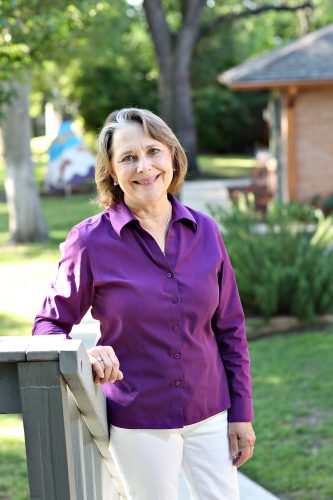
Amy Henderson, head of the Montessori School, is a TCU alumna. Photo by Carolyn Cruz
“Parents were behind a lot of our growth,” said Amy Henderson, who worked in the Fort Worth Independent School District for seven years before she joined the Montessori school’s teaching staff in 1984. Henderson and her husband, Pat, bought the school in 2003, and she became the head of school. Pat Henderson died in 2016.
Today, the campus has seven buildings — including one for seventh- and eighth-graders — arranged around a central playground area. Interior walls were removed in each of the former homes to promote an atmosphere of openness and inclusion.
“What we hope to do is spark a love of learning with even our youngest students through a classroom setting that encourages freedom within limits,” Henderson said. “Even in the toddler classes, you see how busy the children are, but they are also so peaceful in part because they are focusing on self-chosen activities.”
That aspect has helped many students succeed.
“The fact that we got to choose what we were doing inspired us to be more engaged in our own education,” said Loren Trice ’15, who studied history at TCU and is in her final year of law school at the University of Tulsa in Oklahoma. “Even at a young age, we started doing research projects, and the teachers were not hovering over us all the time. That kind of training and the time-management skills that went with it helped me tremendously in college and now.”
Carr, meanwhile, appreciates how the classrooms are filled with tools, not toys: “Grayson helps me make his own dinner every night and then clears his plate afterward, something we started doing in order to create greater consistency between home and school.
“We bought him a small container garden and got him an actual set of small garden tools, not the toy version. He became very invested in whether his peas were growing.”
Learning through doing remains a hallmark of the Montessori approach to education.
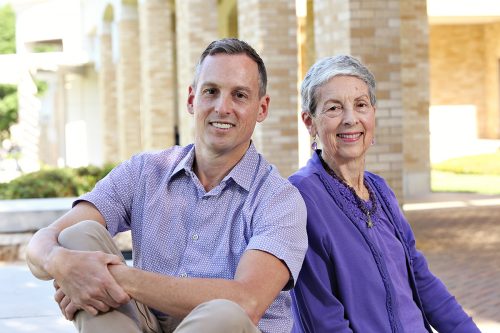
Mary Ruth Jones, who has worked at TCU for about 35 years, sent her three children to the Montessori School of Fort Worth, including Clark Jones, a biology instructor at TCU. Photo by Carolyn Cruz
“Classroom time was exciting, whether we were exploring the natural world or interacting with our fellow students,” said school alumnus Clark Jones ’89 (MS ’92), a biology instructor at TCU and son of Mary Ruth Jones. “It was a chance to live the academics through work, through projects and through collaboration.
“In a way, that is what we are seeing at TCU right now, getting away from passive lectures and encouraging students to engage faculty so that school is far more than just a desk and a chair.”
Beyond the Basics
Today, some 225 students from 18 months to 14 years old attend the Montessori school. Unlike most of their public- and private-school counterparts, the school’s 26 teachers do not give students traditional grades. Rather, students must master concepts and skills, demonstrating their knowledge at a rate of 85 percent or above during evaluations.
When the Montessori students need extra help, the teachers (typically three per building) work with each child one-on-one. Children wishing to accelerate ask for additional work.
“There is also a metacognition component to what we do here,” said Henderson, a former president of the American Montessori Society, a nonprofit advocacy group that has about 13,000 members. “Our students spend time thinking about how they learn, which helps set them up later for success.”
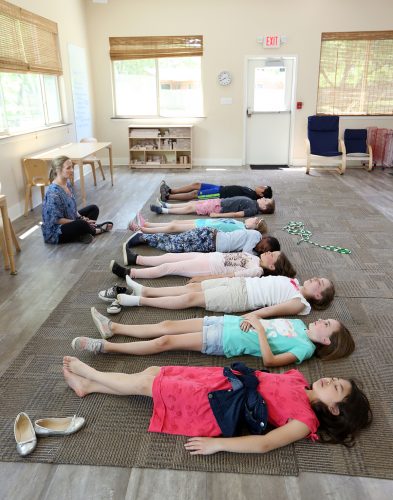
Jaye Poland leads students through mindful relaxation before their next class. Photo by Carolyn Cruz
Beyond math, science, reading and writing (including cursive penmanship, an increasing rarity in schools), classes include art, Spanish and music. Upper elementary students also study keyboarding and yoga. Middle schoolers have the option of learning sign language.
Students also embrace a range of activities, some of which afford interaction with the TCU community. In March, more than 70 students and families registered for the Rhino Run, raising money to combat poaching.
During the fall semester in 2016, two TCU students convened a Model United Nations conference for the middle schoolers. “What amazed me about the Montessori students was that they were remarkably inquisitive, and they approached the simulation in a really creative way with a willingness to engage in complex topics,” said Eric Cox, associate professor of political science and director of TCU’s Model United Nations program.
Ellen Renaud Dast ’69 began teaching at the Montessori school in 1973. A few years later she and her family moved to Douala, Cameroon, but Dast remained in contact with Sheffield, who encouraged Dast to start a Montessori preschool in Central Africa.
Upon returning to Fort Worth two decades later, Dast approached the school administrators with the idea of teaching classes on etiquette. “Responding in a compassionate, personal way to others in an often impersonal world is the core of good manners,” she said. “I think the children have a good grasp of this concept.”
Indeed, even 3-year-olds shake Dast’s hand and look her in the eye as they practice the fine art of the introduction. During one class where students sat on a rug in a circle around Dast, she reminded them that “it is important to be considerate, courteous, gracious and respectful, and it is easy to be polite when you follow the Golden Rule.”
To the delight of many parents, Dast’s etiquette lessons seem to stick. “We have mothers and fathers tell us that when they have gone to fancy dinners at restaurants like the Mansion on Turtle Creek, their children knew the proper fork to use,” Henderson said.
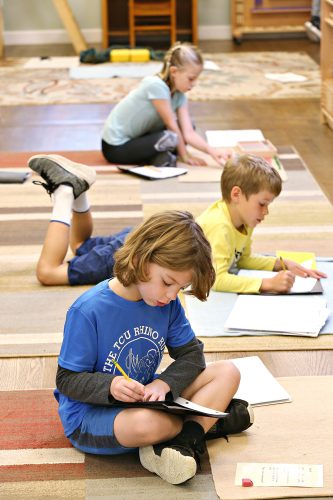
Henry Arnold (front) works on his lessons at the Montessori School of Fort Worth. Photo by Carolyn Cruz
Carr related an experience with her son: “[Grayson] had been going to school only about eight months when we took him to a TCU Christmas party hosted by my department at a faculty member’s house.
“My husband and I were not sure how he was going to react, considering he had never met most of the 50 people there,” she said. “But when the first person walked up to him, Grayson put out his hand and said, ‘Nice to meet you.’ My colleague was flabbergasted. It was such a cool thing to watch.”
Pride of Place
On a philosophical level, Samuel Arnold, assistant professor of political science at TCU, felt “a bit conflicted” about the decision to send his now-second-grader to a private school.
“I went to public school and my wife did, and I know the two of us could be resources to a local school,” Arnold said. “But while I do feel some tension there, it is hard to put political principles over what is best for your kid, and the Montessori School of Fort Worth has been a really great environment for Henry.”
Jean Marie Brown ’13 MS, assistant professor of professional practice in journalism and director of student media at TCU, sent her two daughters to the Montessori school and continues to volunteer there, long after their graduations. “Their classes taught them how to learn and to think,” said Brown, who also served on the board of directors of the American Montessori Association. “To me, the school is the best little secret in Fort Worth.”
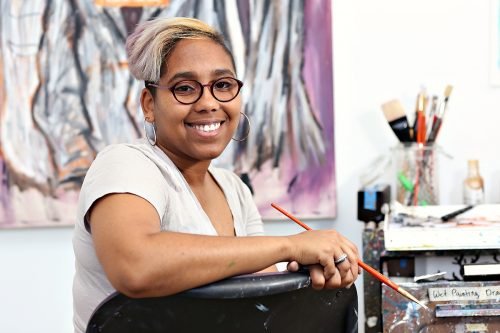
Lillian Young, a senior studio art major, attended the Montessori School of Fort Worth from age 5 until the sixth grade. Photo by Carolyn Cruz
Added Brown’s older daughter, Lillian Young, a senior studio art major at TCU: “I did not realize how advanced we were until I went into high school. My friends were telling me that they learned to multiply fractions in fourth grade. That was something we were doing in first grade.”
Faculty members also feel fortunate to be part of the school.
“We have a high level of expectation for our students, and it is a joy to mentor them,” said Morgan Dezendorf Jansing ’09 MS, an upper elementary teacher at the Montessori school, where she works with 33 students and two co-teachers. “I have also enjoyed watching the sixth-graders become the leaders of the class and help with the transition for the fourth-graders.”
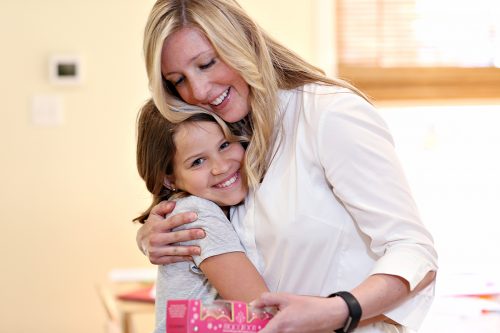
Fourth-grader Karina Johnson hugs upper elementary teacher Morgan Dezendorf Jansing during Teacher Appreciation Week. Photo by Carolyn Cruz
Henderson’s two sons attended the Montessori school and now help her with its operations. In keeping with the TCU connection, one son holds a bachelor of fine arts in studio art, and the other son earned two bachelor’s degrees (environmental science and geography) and a master’s degree in environmental science.
Brett Henderson ’07 considers the Montessori campus a kind of utopia for younger learners. “The world today in some ways is a little frightening, so it is especially wonderful to have a place where kids are able to follow their dreams and are supported in that. And going forward, my mom will continue to build upon the legacy we have here.”

Brothers Brett Henderson (left) and Byron Henderson attended the Montessori school as children and now help their mother with its operations. Photo by Carolyn Cruz
Byron Henderson ’08 (MS ’10) noted that his mother has devoted several summers to training Montessori teachers in Texas and abroad, including Canada and Saudi Arabia, which has served to enhance the Fort Worth school’s reputation for a tradition of excellence. “My mom and this school have always focused on developing the whole child, not only their education but the respect element and their independence,” he said. “All of the teachers we have at the school are cut from the same cloth and are passionate about being here, being present for the kids and helping them build their dreams.”
For 3-year-old Grayson Carr, those dreams include turning 5, when primary students are finally allowed to climb a ladder to a loft where they can sit and read books. “The teachers do such a great job of managing their classroom and the expectations of their students that Gray’s not frustrated about having to wait but instead is excited about getting there,” Kristen Carr said.
Amy Henderson looks forward to another 50 years of growth at the Montessori School of Fort Worth. “I love this place and what I do,” she said. “People always ask me where I work. I say I don’t. I go to school.”

Your comments are welcome
1 Comment
Related reading:
Features
Community Scholars Bring New Perspectives
Scholarship program opens up a world of possibilities to North Texas’s underserved elite students.
Features
Starpoint School’s Special Education
At age 50, the on-campus lab school is still giving students a chance to shine.
Features
KinderFrogs Overcome Developmental Delays
Preschoolers with Down syndrome prep for traditional classrooms.